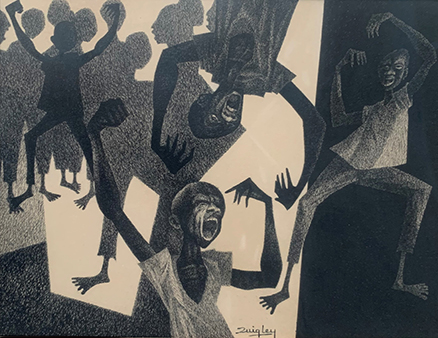Picture of the Week: Untitled by Robert Quigley
November 4, 2022

Robert Quigley is an accomplished Detroit artist. In 1950, he won the John S. Newberry Purchase Prize and the Detroit Museum of Art Founder’s Society Prize. Some of Quigley’s work is part of the permanent collection at the Detroit Institute of Arts, including Landscape with Figures (1950) and The Victorious (1951). Quigley passed away in 2005, but he will forever be remembered as a beloved artist, husband, father, grandfather, and great-grandfather.
Quigley’s untitled 1960 ink work is currently on view at the Elaine L. Jacob Gallery in Confluent: Detroit Art and the University Art Collection. The date of this work indicates that Quigley composed it during the Civil Rights Movement. Quigley’s use of black and white in this image may reference the racial tensions between Black and White Americans this time. This image does not contain much context for the setting, rather Quigley focuses on abstracted figures with long limbs and caricature-like faces. They pose with outstretched arms and legs, with one figure who has been drawn upside down.The background figures appear as shadows or silhouettes, while Quigley renders the foreground figures with more detail. In addition to their expressive body language, the three figures in the foreground have very animated faces. Their mouths are open wide, as if to connote frustration and exhaustion, perhaps towards institutionalized racism and the oppression of African Americans that has gone on for centuries. The use of caricature-like faces as opposed to naturalistic features may reference the racist history of minstrelsy and coon imagery that was used to depict Black Americans during the nineteenth and early twentieth century; Quigley’s choice to leave the figures barefoot may reference racist coon imagery and minstrelsy as well. In referencing these representations, perhaps Quigley is in turn expressing the pain and internalized racism African Americans experience as a result.
This untitled work by Quigley is placed next to You Free, Black (2022), a sound work by artist, curator, and activist Darryl DeAngelo Terrell in the Confluent exhibition. Terrell explores how Black people are affected by the powers that be, and how folklore and rituals can aid in the journey to Black liberation. This audio piece includes vocals along with trumpets, what sounds like string instruments, wind, waves, and birds chirping. The instruments used in the work are reminiscent of jazz music and in turn celebrate an aspect of Black culture. Additionally, nature sounds connote a feeling of freedom, an escape from the rigid institutions of the powers that be. The pairing of Quigley’s 1960 work and Terrell’s 2022 work may be a way to communicate that the fight for the equality of Black Americans is far from over; issues like police brutality and institutionalized racism as a whole are still prevalent today. Moreover, the timelessness of both works may communicate that the notion of freedom is not isolated to one moment in time but transcends time.
Written by Angela Athnasios
Sources: https://www.legacy.com/us/obituaries/detroitnews/name/robert-quigley-obituary?pid=182869096
https://www.darryldterrell.com/about
https://dia.org/search?keys=robert%20quigley